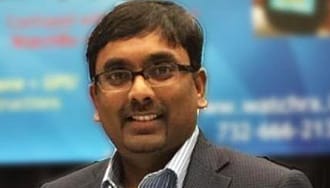Leaps of faith
When people think of Craigslist, they probably think about second-hand furniture, apartment rentals, odd jobs. But in 2016, when Arun Buduri was searching for a contract job with a startup, he found more than what he was looking for – a co-founder in Chris Cleveland who initially advertised for a coder on the website.
It was an interesting time for Buduri. A previous entrepreneurial attempt had proved financially challenging, his savings were eroded and credit cards were approaching full limits, the family was making do with his wife’s salary – and a baby was on the way.
Buduri responded to the ad, he and Cleveland struck up a conversation on Skype, and soon after they agreed to be co-founders in Pixm, which offers an endpoint-based anti-phishing solution.
“Even without meeting in person we made that decision and we signed all the agreements online,” Buduri, now President, says. “It all boiled down to mutual trust. It’s that sense you get the first time you talk to each other.”
From big enterprise to startup
Buduri had had a long experience with big corporations such as Nortel, Microsoft and Ingersoll Rand. His life as an entrepreneur began at Ingersoll Rand where he pioneered the creation and launch of a brand-new home automation business for Ingersoll Rand in India. This experience proved incredibly valuable and pushed Buduri to see what the other side of business – the startup side – looked and felt like.
He saw that startups provided a unique end-to-end perspective, because they were very close to the customer. “The talent is just amazing – and these are people in their 20s, not people with decades of experience. They are among the best developers I have worked with,” Buduri says.
“Plus, there is not too much politics because the team is so small. So, it’s all about building the product and the organization, getting customers, surviving. It’s fun!”
It is this environment in which Buduri wanted to thrive, and he saw an opportunity when Cleveland – who started Pixm after dropping out of his masters in machine learning when he won an award for his idea – offered him the partnership.
At the outset, the two were a sound match. “I had the industry and product experience and he had the deep learning experience. I guess I had what he wanted, and he had what I wanted.”
It was only when the two had agreed on their venture that they finally met, at an intensive three-month accelerator event at Highland Capital. Even then, there were problems. “We knew we only had money for the next three months,” Buduri says.
The pressure continued to mount: The baby was born, they had just moved into a new home, the wife tried to support the family singlehandedly, and Buduri had foregone at least two lucrative job offers because he had decided he wanted to see where Pixm would be headed. “I would say my wife is my biggest investor,” Buduri said.
Fortunately, the other investors came in 2017, and infused more capital than what Buduri and Cleveland expected.
Click away, anyway
“I think it boils down to the fact that people were seeing what we were doing to solve a real problem,” Buduri says.
And indeed, the problem of phishing, while becoming more well-known, was not necessarily being lessened. According to Buduri, two years ago, 91% of breaches started with phishing attacks. With greater awareness one would expect the numbers to be down. But no – the percentage has in fact risen to 93% today. The problem is getting more prevalent – the Marriotts and the Dunkin Donuts and the Quoras all emerged publicly in a span of a few days, he said.
Buduri takes pride in Pixm’s unique and first-of-its kind approach to addressing phishing. An endpoint intervention, he believes, is necessary for at least two reasons: First, people, despite being warned about phishing’s consequences and trained on how to spot phishing attempts so they could avoid falling victim to them, will continue to click on links and give away their passwords, anyway.
“Even after all the training, average click rate remains at 20% to 30%. People could be distracted, or tired, or in a hurry,” he says.
Second, the bad guys are resorting to what is known as cloaking to escape detection. They make sure that only their potential victim, on his or her device, gets to the phishing page.
“The problem is that phishing has three dimensions: You have location, device and source. Your office environment may be secure, but what if you open your email while at home or while you are traveling?” This is especially true as people’s lifestyles and work habits evolve.
Take five
Buduri offers sage advice on how to deal with stress on the job: Don’t stress in the first place. “Always ask yourself, what’s the worst thing that can happen? If you believe in yourself and your talent, you can always find a great job. Big deal. Life will go on. But your passion and perseverance matter, and this won’t be your last startup.”
Entrepreneurs like him are expected to attend to numerous things at the same time, but Buduri’s solution is simple: “Out of the million things you have to do, identify the five things you must absolutely do,” he says.
“So, it is not about doing a hundred but accomplishing those five that really matter. Just keep pushing.”
In hindsight, Buduri is happy to have made that leap of faith with Pixm. “There was no way I was not taking that risk,” he says. “Now I could be making a lot more money outside, but here I know I have built my career with a product that really makes a difference.”

